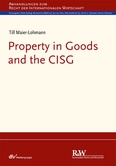223 § 6: Exclusion under Article 4, sentence 2(b) of the CISG
505
The CISG does not apply to all conflicts arising between the parties. Although Article 30 provides for an obligation to transfer the property, Article 4, sentence 2(b) excludes “the effect which the contract may have on the property in the goods sold” from the scope of the Convention. This provision’s general rule dates back to the earliest stages of the unification process when the members of the Commission at Unidroit faced the undeniable reality of far-reaching differences in the transfer of property under national law1045 outlined above.1046 Already then, the practical insight prevailed that it might be possible to untie the relevant questions under international sales contracts from property and, thereby, make uniform rules on the transfer of property dispensable.1047 This approach won the day and was nearly verbatim adopted by the Secretariat’s Commentary many years later:
“It was not regarded possible to unify the rule on this point nor was it regarded necessary to do so, since rules are provided in the convention for several questions linked, at least in certain legal systems, to the passing of property: the obligation of the seller to transfer the goods free from any right or claim of a third person not accepted by the buyer; the obligation of the buyer to pay the price; the passing of the risk of loss or damage to the goods; the obligation to preserve the goods.”1048
506
Surprisingly, when commercial law in parts of Africa was unified by the Organisation pour l’Harmonisation en Afrique du Droit des Affaires (“OHADA”) by its Acte uniforme relatif au droit commercial général of 1997 (OHADA Uniform Commercial Law 1997), the transfer of property was explicitly regulated in Articles 283–284. Slightly amended in 2010, Articles 275 and 276 of the OHADA Uniform Commercial Law 2010 provide for the transfer of property generally to take place when the buyer takes delivery of the goods, while the parties can agree on a retention of property clause in line with Articles 72–78 of the OHADA Uniform Security Law 2010.
507
Yet, OHADA did not face the same challenges encountered by the drafters of global uniform sales law, as it did not have to debate a generally acceptable rule nor the remaining relevance of property: At the time of this writing, OHADA has 17 Member States from Central Africa. With the exceptions of Guinea-Bissau, Equatorial Guinea and Cameroon, all Member States are former French colonies.1049 A unification of the transfer of property would consequently not have been met with the argument of unbridgeable gaps in the respective existing national laws. Thus, it is unsurprising that a uniform solution was found. Yet, these countries decided against the French model of transfer of property solo consensu in favor of the approach requiring handing-over of the goods. This can only be explained against the background of the connection between the transfer of risk that is undertaken by Article 277 of the OHADA Uniform Commercial Law 2010.1050 This connection, in turn, explains why rules on the transfer of property could not be omitted in the OHADA Uniform Commercial Law. For these reasons, it was necessary but also possible to unify rules on the transfer of property under the OHADA Uniform Commercial Law in contrast to the CISG.
| 1045 | Hamel, pp. 301, 307. |
| 1046 | For the different approaches to the transfer of property, see above paras. 57 et seq. |
| 1047 | Hamel, pp. 301, 308. Contra Netherlands, sub. e) part of S. D.N.-U. D.P. 1936 – Etude IV Vente – Doc. 82 and Poland, part of S. D.N.-U. D.P. 1936 – Etude IV – Vente – Doc. 82, who considered leaving out the transfer of property to be a notable deficit. |
| 1048 | Secretariat Commentary, Art. 4 para. 4; this wording was already contained in UNCITRAL Yearbook VII (1976) p. 101 Art. 7 para. 4. |
| 1049 | Chianale, Singapore Journal of Legal Studies (2016), 29, 40. |
| 1050 | Art. 277 OHADA Uniform Commercial Law 2010: “Le transfert de propriété entraîne le transfert des risques à l’acheteur.” |


